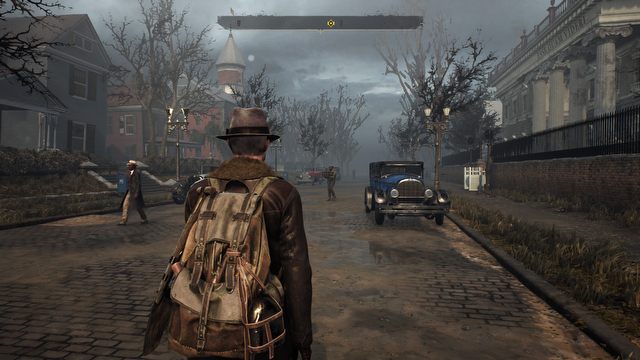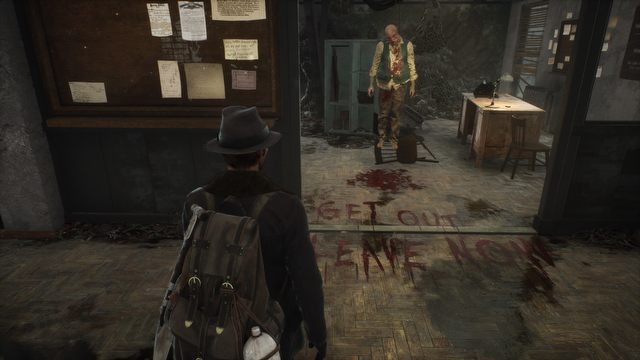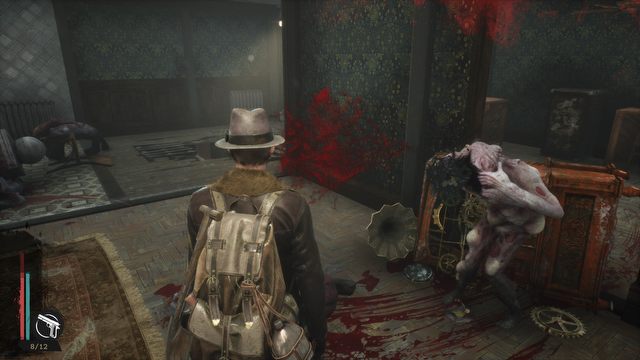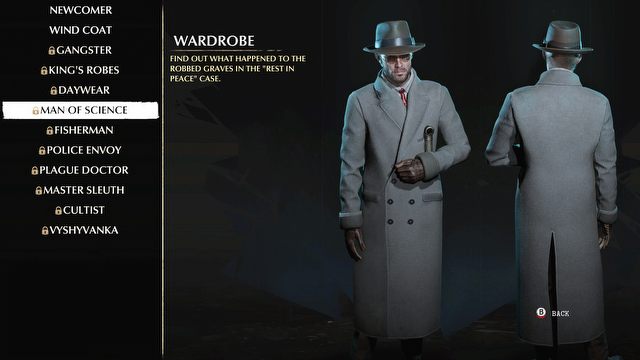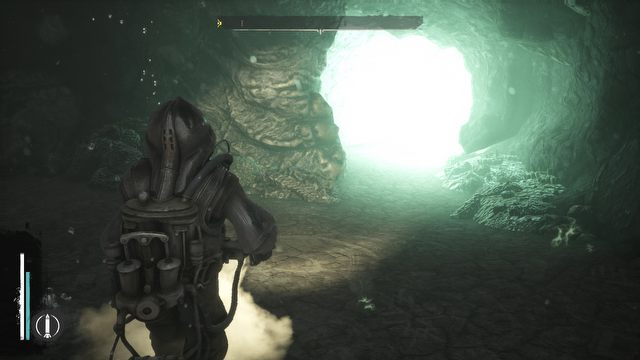Sinking City Review – Sherlock Holmes vs. Cthulhu
The authors of the series of games about Sherlock Holmes opted for the prose of H. P. Lovecraft and seem to have knuckled under to the power of the Great Old Ones. The Sinking City turned out a decent detective adventure, but not much more.
The review is based on the PC version.
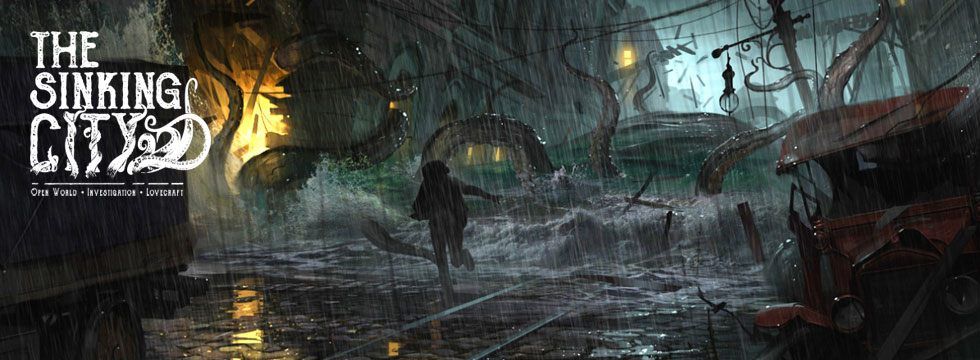
Did I ever tell you the definition of "insanity"?
- engrossing investigation mechanics;
- the story in some of the Cases;
- the game doesn't bluntly tell you what the next step is;
- interesting choices during the investigations, the consequences are revealed later in the game;
- rich equipment and armament;
- "one more case" syndrome;
- despite the poor graphics, the city can look very atmospheric.
- crude audiovisual design, poor animation;
- a real festival of graphics "copy-pasting”;
- somewhat annoying combat sequences;
- almost all Cases utilize the same pattern;
- the main thread based on Lovecraft's prose is rather unimpressive.
It's random manipulation of the field of view and orange spectra of different characters – at least, according to the developers of The Sinking City from Frogwares. The authors of a substantial series of games about Sherlock Holmes opted for the prose of H. P. Lovecraft and seem to have knuckled under to the power of the Great Old Ones. The Sinking City turned out a decent detective adventure – if you can shut your eyes to crude production quality, which is way below today standards.
All the while, I was under the impression that references to Lovecraft served as mere excuse for fighting bizarre creatures, being able to visually rehearse the events from a crime scene, or offering the players some dramatic choices around the end of the story. The fictional city of Oakmont has plenty of "normal" problems – with refugees, racial prejudice, corrupt politicians, or gangsters – which renders the supernatural side of the story rather opaque. Theoretically, it's all closely related, but I found searching for street murderers invariably more exciting than figuring out what those tentacle monuments are doing at the bottom of the sea. The Sinking City is a bit like L.A. Noir seasoned with some Cthulhu (which is the perfect seasoning by any margin). Mildly scary, moderately crazy, but still exciting and interesting.
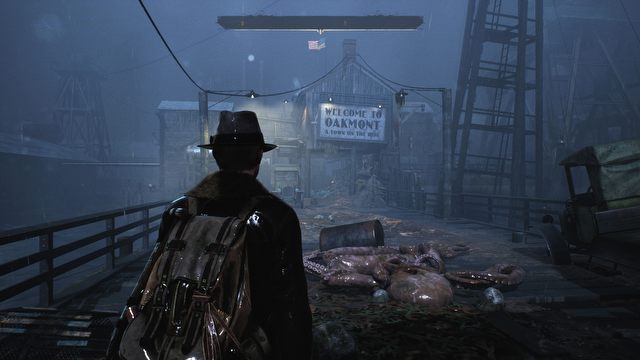
It's scary and tentacly at first. But then, the metropolis starts to dominate. In The Sinking City, scientists are experimenting for the Old Ones.
In the current of crime
The character of a private detective, a veteran of the First World War tormented by nightmares, seems almost a cliché in games based on the prose of Lovecraft and the Cthulhu mythos. Charles Reed, a former deep-sea diver from Boston, arrives in Oakmont to solve the mystery of the strange flood and the mysterious hallucinations and nightmares that also harrow him. Unlike Call of Cthulhu published last year, however, where we had to deal with a single mystery, here, we have to solve the problems of the entire city.
The story is based on the "I'll tell you if you sort this thing out for me" principle. One task suddenly branches out into a series of new ones, and the threads that appear along the way often prove more interesting than the original one. This is supplemented by optional side cases commissioned by random strangers, the combined length of which effectively dissolves the entire affair of the cult of the Old Ones somewhere along the way, and most of the exposition ending up being dedicated to the lesser cases that are served in a more compelling form.
THE CTHULHU MYTHOS WITHOUT CTHULHU
The The Sinking City was developed among a small confusion. Initially, Frogwares was supposed to develop a game called Call of Cthulhu, which was ultimately made by Cyanide and Focus Interactive studios. Frogwares, however, continued to work on their game based on the Prose of H. P. Lovecraft – most likely without a license for the Call of Cthulhu franchise, which is why the game never spells out the blasphemous name, and features no quites in the language of the Old Ones. The main deity in The Sinking City is called Cthygonnaar. Instead, we find mentions of the city of Innsmouth, human-fish hybrids, and a lot of easter eggs readily recognizable to the fans of H. P. Lovecraft's output.
Great Old Ones vs urban jungle
The general idea for the city of Oakmont seemingly didn't help in creating a mystical, disturbing atmosphere straight from the works of Lovecraft. This is no longer the small town of Innsmouth from Dark Corners of the Earth, where everyone was suspicious of the protagonist, nor the Darkwater isle from Call of Cthulhu. Oakmont is a metropolis that used to have trams, the streets of which are piled with dilapidated vehicles. The atmosphere is eery, but all the unsettling stuff is nullified with usual, mundane stuff.
People suffer hallucinations, horrendous abominations come out of the ground and prey on passers-by, sperm whales rot around buildings, someone's getting battered in a back alley. Yet, among all this, we see some character fishing carelessly, a newspaper man shouting the latest news, and bars full of people bending the elbow. In the city, instead of horror and mystery, we witness the power struggle of local, influential families, smugglers doing their thing, Ku Klux Klan haunting racial minorities, and fish-faced refugees of Innsmouth. The feeling of growing madness or impending death is nowhere to be found; there's only the constant argument between the supernatural occurrences and every-day crime, with the latter usually taking the cake.

UKRAINIAN GAMEDEV
The gamedev from Ukraine is usually associated with the S. T. A. L. K. E. R. and Metro series, and not everyone knows that Frogwares is also based in Kiev, the capital of Ukraine. The company, which today employs about 80 people, was founded in 2000 and has been mainly engaged in a series of games about Sherlock Holmes, which sold a total of seven million copies. The Sinking City is by far the most ambitious and the most sizable project of the studio.
Cthulhu Detective
The investigations mechanics is probably the reason for all the down-to-earth cases being so fun in The Sinking City. We will not find here any environmental puzzles or QTE sequences. In addition to occasional combat and diving, the focus of the gameplay is collecting evidence and clues in different locations, reading notes, interrogating witnesses and suspects. The game is not particularly difficult, but almost never leads the player by the hand. The map of the city of Oakmont is our command center – without facilitations the like of a flashing icons yelling GO HERE DUDE. The only way to know what's the next step is to figure it out yourself, often having to guess where to look for help: the police chronicles, the archives of the local newspaper, or maybe in the city hall registry?
We also make a lot of ambiguous decisions during the investigations. You have to decide which person has the best intentions, if the offender really deserves punishment, and the game even manages to deliver quite a powerful moral issue towards the end, albiet during a side case. The authors managed to make sure that the consequences of some choices can really be experienced later on, usually at the point when you've forgotten about the whole thing. All of this makes the investigations extremely involving, regardless of the fact that they become somewhat repetitive after some time.
Toothless crudeness
Combat can be disappointing when contrasted against the engrossing investigations. Charles Reed, once a private investigator, carries around an arsenal that could embaras most of the tough guys from Far Cry. Shotgun, machine gun, hand guns, machetes, grenades, Molotov cocktails or traps – a bit of an overkill if you consider that usually just a few creatures need to be dealt with. This, however, allowed the authors to cram a triple tree of development, and crafting into the game. Combat is unfortunately disappointing, it's no fun, and you fight because you need to. Animations are clunky, and the enemies more annoying than scary – especially the one, who teleported away whenever I shot at him.
Combat mostly confirms to the unrefined character of the whole. In this respect, The Sinking City resembles last year's Call of Cthulhu and games from the previous generation. The city consists of quite pretty tenements, the districts differ from each other with some details, but the visibility range is tiny, and low-quality textures are sometimes scarier than the monsters. It does admittedly reinforce the atmosphere at times, but otherwise it's mostly unpleasant to watch. The sinking city is also a real festival of copy-paste graphical assets. Any apartment which you can enter looks identical, and the degree of similarity between all the NPCs (who are rather scarce in the first place) makes you question the moral standards in the city. Really, you listen to an augur of a local witch, and a few minutes later the same lady serves you drinks at the bar.
I would venture to say the team didn't set their priorities totally right – how else can you explain the fact that there wasn't enough time or resources to create a more diverse pool of characters, that the cut-scenes with the disapointing conclusions last but a few seconds, while at the same time, the protagonist has access to an impressive range of attire to unlock during the game, or via DLCs. Wasted potential, I tell you, especially since a decked-out detective roaming the streets of a musty, flooded city looks like someone from another book.
CAN YOU SEE THAT, WATSON?
Frogwares has created eight games with Sherlock Holmes since 2002. All of them turned out average, with Metacritic ratings oscilating around 60-70%. But there were also some mishaps along the way. Sherlock Holmes and the Mystery of Osborne House for the DS was rated 48/100. On the other hand, the PC version of Sherlock Holmes: Crimes & Punishments from 2014 earned a respectable 77%. In The Sinking City we will find a small mention of this series, among some other easter eggs.
Sherlock Holmes vs. Cthulhu
Still, The Sinking City is predominantly about Arthur Conan Doyle rather than H. P. Lovecraft. Maybe the plans of the team were spoiled by having no access to the Call of Cthulhu franchise, maybe it was by design. In general, I was under the impression that the creators found the invention of supernatural threads with apt dialogues, scraps of information, and endings that would make sense rather troublesome, but when it came to regular corruption or human vileness, they took to it like a duck to water.
Despite the fact that the plot is unmemorable, the game compensates with all sorts of minor cases with the power to surprise the players, or at least keep them engaged when learning the fate of some minor character. In The Sinking City we can also experience a variation of the infamous "just one more turn" syndrome, in this case taking the form of "another location to visit", "another conversation to hold" or "another clue to follow." The game looks rough, but it is addictive. The mighty Cthulhu drowned a bit in the sinking city. But Sherlock Holmes would feel at home.
ABOUT THE AUTHOR
I finished The Sinking City in about 17 hours, completing all of the story missions and just a few side-quests of at least a dozen others. I played last year's Call of Cthulhu, and I think that overall, that game was a bit worse, but definitely gave more justice to the atmosphere of Lovecraft's books. The Sinking City betters that title with gameplay, and proves an addictive private detective simulator. Despite outdated graphics and sound effects, the dozen hours or so I spent with the game was definitely a good time.
DISCLAIMER
We've recieved a review copy of the game directly from Wire Tap Media.
The Sinking City
Sinking City Review – Sherlock Holmes vs. Cthulhu
The authors of the series of games about Sherlock Holmes opted for the prose of H. P. Lovecraft and seem to have knuckled under to the power of the Great Old Ones. The Sinking City turned out a decent detective adventure, but not much more.

